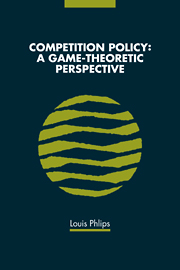4 - Cartel enforcement
Published online by Cambridge University Press: 23 September 2009
Summary
In chapter 2, all players were perfectly informed of the choices made by all other players (at the end of each stage of the games considered). All players also knew the demand parameters and had the same cost parameters: there was ‘complete’ information. These strong assumptions are appropriate when the problem is to find out under what market structure it is profitable for a firm to be a member of a cartel. The firms' decision was to join or not to join. And this decision depended crucially, for a particular firm, on how many other firms decided not to join. To join implied sticking to the agreed quota or supplying less.
In this chapter, the internal functioning of a given cartel is studied. Now the problem arises to what extent cartel members may want to deviate from an agreement by selling more than their quota. Such a deviation is called ‘cheating’, because the deviation is profitable only if it can be done secretly to avoid immediate punishment. It is then necessary to suppose that information is imperfect. For the cartel to be viable, however, it must be possible to punish the cheater and to threaten the deviator with retaliation in a credible way. This in turn implies that the deviation must be detectable. Section 4.1 shows how a credible deterrent to individual cheating can be worked out.
Section 4.2 is devoted to collusion enforcement under perfect but incomplete information about the firms' cost parameters.
- Type
- Chapter
- Information
- Competition PolicyA Game-Theoretic Perspective, pp. 47 - 78Publisher: Cambridge University PressPrint publication year: 1995



